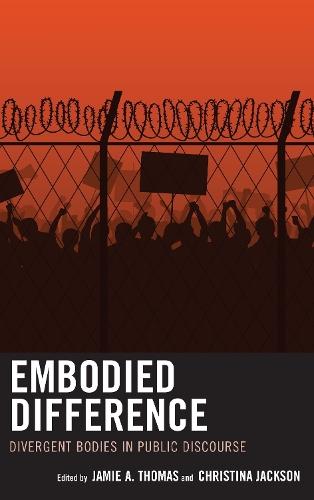
Embodied Difference: Divergent Bodies in Public Discourse
(Hardback)
Available Formats
Publishing Details
Embodied Difference: Divergent Bodies in Public Discourse
By (Author) Jamie A. Thomas
Edited by Christina Jackson
Contributions by Jamie A. Thomas
Contributions by Christina Jackson
Contributions by Emily August
Contributions by Barry R. Furrow
Contributions by Katrina Richter
Contributions by Krista K. Thomason
Contributions by John S. Michael
Contributions by Paul Wolff Mitchell
Bloomsbury Publishing PLC
Lexington Books
20th February 2019
United States
Classifications
Professional and Scholarly
Non Fiction
Feminism and feminist theory
Folklore studies / Study of myth
Popular culture
Gender studies: women and girls
305.5601
Physical Properties
Hardback
268
Width 159mm, Height 231mm, Spine 22mm
576g
Description
Focusing on the body as a visual and discursive platform across public space, we study marginalization as a sociocultural practice and hegemonic schema. Whereas mass incarceration and law enforcement readily feature in discussions of institutionalized racism, we differently highlight understudied sites of normalization and exclusion. Our combined effort centers upon physical contexts (skeletons, pageant stages, gentrifying neighborhoods), discursive spaces (medical textbooks, legal battles, dance pedagogy, vampire narratives) and philosophical arenas (morality, genocide, physician-assisted suicide, cryonic preservation, transfeminism) to deconstruct seemingly intrinsic connections between body and behavior, Whiteness and normativity.
Reviews
Embodied Difference: Divergent Bodies in Public Discourse is a refreshingly interdisciplinary consideration of embodiment as a site of agency, oppression, and knowledge production. It is all too easy, in the face of Western societys enculturated somatophobia, to forget that our bodies are a matrix of sense receptors caught in a web of political constructs; that through the body we both experience and are experienced by the world. As such, the body is intrinsic to the formation of self, other, community, and culture. This text incites a welcome and timely discourse, which honors our lived experience, by making explicit the connections between our corporeal flesh and our cultural foundations. -- Catherine Cabeen, Marymount Manhattan College
While intersectional feminist theory has captured the attention of numerous scholar/activists throughout the U.S. academy and beyond, rarely has it been so brilliantly operationalized as is the case in this cross-disciplinary, co-edited anthology. The broad range of themes is breathtaking scientific racism, transfeminism, American dance, urban development/gentrification, sci-fi films, right-to-die cases, Gray's Anatomy, the relentlessness of racial inequality. Professors Jamie A. Thomas and Christina Jackson have assembled a diverse group of experts whose provocative explorations of the causes and consequences of social inequality over time make visible in new ways the challenges and dangers we now face in the aftermath of a deeply polarizing 2016 Presidential election. -- Beverly Guy-Sheftall, Anna J. Cooper Professor of Comparative Womens Studies at Spelman College and co-author of GENDER TALK: THE STRUGGLE FOR WOMENS EQUALITY IN AFRICAN AMERICAN COMMUNITIES
Author Bio
Jamie A. Thomas is assistant professor of linguistics at Swarthmore College. Christina Jackson is assistant professor of sociology at Stockton University.
